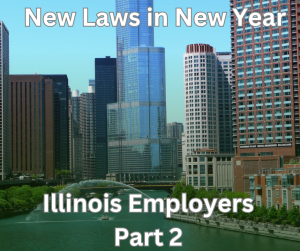Illinois small businesses need to get up to speed on a variety of state legislation passed in the previous session that came online on January 1.
We covered several new provisions in a post last week, including a higher state minimum wage and legislation prohibiting “capture audience meetings” focused on religion or politics, requiring “pay scale and benefits” information in all job postings, adding new requirements for businesses that want to employ children under age 16, and banning non-compete agreements for certain classes of workers.
 Chicago Business Attorney Blog
Chicago Business Attorney Blog





